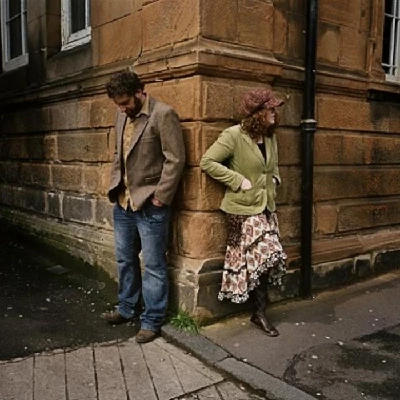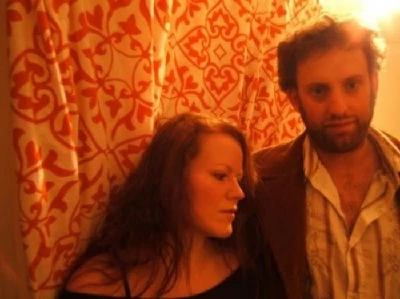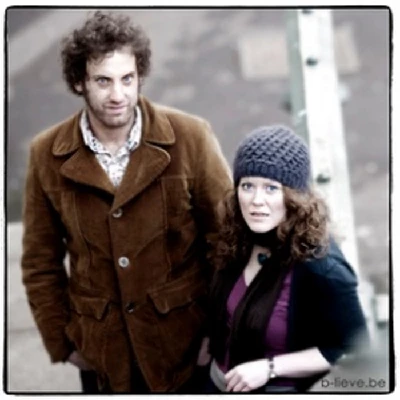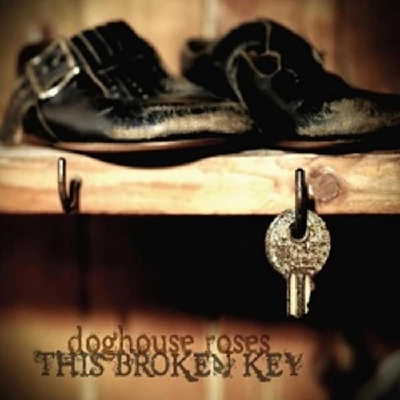published: 20 /
3 /
2011
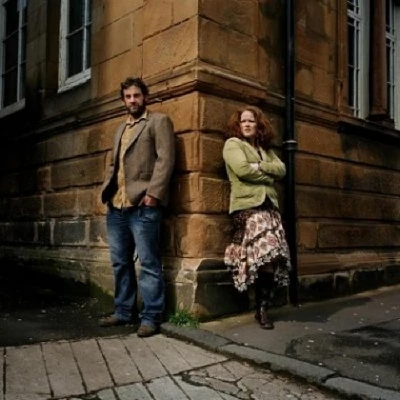
Doghouse Roses is the much acclaimed Glasgow-based folk duo of singer Iona McDonald and guitarist Paul Tasker . Malcolm Carter speaks to Paul Tasker about his band, who have toured with the Willard Grant Conspiracy, and their self-released second album, 'The Broken Key'
Article
Doghouse Roses are a Scottish-based duo that, despite being strongly influenced by British folk music from the sixties tinged with Americana, still manage to sound contemporary. Over the course of two albums and three EPs which have all been released on their own Yellowroom Music label, the duo have left their mark on those who rated bands such as Fairport Convention and Pentangle. While singer Iona MacDonald is far from a Sandy Denny copyist one can’t help but recall Denny’s vocals when listening to Doghouse Roses. Denny’s vocals had that timeless quality and in years to come Iona’s vocals will still sound fresh; she has the kind of voice that never dates.
But Iona’s remarkable vocal abilities are just half of the appeal of Doghouse Roses. Guitarist Paul Tasker, who, along with Iona writes all of Doghouse Roses' material, has been influenced by another folk giant, namely Bert Jansch in the way he plays his chosen instrument. So it’s no surprise that the duo attract so many Pentangle/Fairport comparisons, but what is surprising is just how solid the songs the pair compose together are.
While Paul Tasker is truly, for the moment at least, an underrated guitarist, his talent can’t go unnoticed for too much longer. Although the duo has attracted a lot of attention through their tours and releases it can only be a matter of time before they break through to a wider audience. Initially it’s Iona’s vocals that draw you to the music of Doghouse Roses, it’s impossible not to be captivated by the pure sounds of this singer, but if they didn’t have the original songs to back up the sounds they make then unfortunately because they wear their influences so proudly on their sleeves they would be seen as merely copyists.
But thankfully, Iona and Paul, especially on latest album, ‘This Broken Key’, prove over the twelve original songs that here is not only an exceptional vocalist and guitarist, but that they are inspired and talented songwriters too. Much like Iona’s vocals and the songs of those they are inspired by, the songs the duo write also have that timeless, classic feel to them.
‘This Broken Key’ is an album that changes each time you hear it. There will be a point where every one of the songs will have been your favourite new song at some time. There always seems to be something new to discover on the album and the fact that some of the songs are growers just adds to its appeal. The duo makes fine use of a band on the album with Hammond, banjo and the usual rhythm section adding texture to the songs.
Iona MacDonald and Paul Tasker are passionate about the music they make and it shows through on ‘This Broken Key’. Despite having his hands full with the various tasks that enable the duo to continue making such fine music, Paul Tasker found time to speak to Pennyblackmusic.
PB: Paul, it’s been mentioned many times now that you were inspired to take up playing the guitar after seeing Bert Jansch play in a club in Glasgow. I’ve seen Bert play a number of times, many years ago, and was also captivated by his playing. But no matter how inspired I was I knew it was pointless even trying to play with my hands of concrete. Surely you had some experience of the instrument before then? Jansch is hardly a player that makes a novice think “I can do that!”!
PT: It is totally true that I’m heavily inspired by Bert Jansch, but I did play before I saw him for the first time. I started playing the guitar around 1993 and friends who already played were showing me bits and pieces like the start of 'Blackbird' by the Beatles and a riff from 'Led Zeppelin 2', that sort of thing. I could string a chord sequence together and play some simple fingerpicking stuff, but I wasn’t really thinking about the guitar as anything other than an accompaniment to songs before I saw Bert Jansch in early 1996.
I really just wanted to try and play one of his songs at the start, so I worked out a version of 'Running Running' from home to start with and then just added little bits and pieces as I could work them out. I still can’t play anywhere near his level though.
PB: Before you formed Doghouse Roses with Iona MacDonald were you in any other bands?
PT: Before Doghouse Roses I’d played in quite a few bands in Aberdeen which is where I come from originally. I’d won a Danny Kyle award at Celtic Connections with another duo called Sal, and we ended up releasing a record. I was also in a traditional music band called Banish Misfortune which was a lot of fun, and a punk, folk techno fusion thing called Potted Heid, which was named after a meat product delicacy popular in the north east. Fred Wilkinson was the main force behind Potted Heid, and before that Fred was songwriter and guitarist for a punk band called Toxik Ephex. Fred wrote a lot of stuff for Potted Heid in Doric, a dialec of Scots, and the angle of the band was whatever part you think would fit a song, play the exact opposite.
PB: Why did you and Iona decide to work together and why the name Doghouse Roses?
PT: It wasn’t really a conscious decision. Iona was singing in small groups around Aberdeen and we didn’t meet through music, but we found that we liked a lot of the same stuff so we’d play a song or two of an evening whilst sitting around in the kitchen.
I was doing a lot of solo gigs then, and we’d do a couple of songs together which became more and more until we would do the whole gig like that. It was never a deliberate project but there came a point we needed a name, and we tried a couple of really terrible ones before Iona thought of using Doghouse Roses. We know it’s the name of Steve Earle’s book of course, but its also the flowers you buy at a petrol station at two in the morning when you should have been home by eleven….it seemed to fit
PB: The comparisons to both Fairport Convention and Pentangle must be wearing you down but with your style of guitar playing and Iona’s vocals they’re inevitable and there are worse bands to be compared to! But are there any other bands/artists who you feel influence your work even more than those bands?
PT: A lot of those comparisons are our own fault…as we were starting to play more gigs people were commenting that they heard a bit of Sandy Denny in Iona’s singing, and you have to try and define your own music somehow so we used those bands as a comparison of where we were coming from.
Iona is also influenced by Natalie Merchant and Kathryn Williams, and my first guitar influence was probably Mark Knopfler. I was also influenced a lot by local musicians. We're situated in Glasgow now, but particularly in Aberdeen where I lived for a long time and where I started playing gigs.I like Davy Cattanach's songwriting a lot and I learned a lot from guitarists in Aberdeen like Dave Moir, John Carnie and Gerry Jablonski. I’m also a big fan of Bruce Springsteen and Jackie Leven who’ve influenced me over the years.
PB: You’ve toured as Doghouse Roses quite a lot, especially in Europe. Do you feel that European audiences are more receptive to your music than the UK is?
PT: We have toured a lot over the last few years, but I’m not sure if any one audience is more receptive than any other. The difficult bit is really getting to play to the people who might like what you do.
PB: Your latest album, ‘This Broken Key’, is released on your own Yellowroom Music label. Surely that has been a struggle to organise all that goes with running your own label with your other projects?
PT: A little bit….you can get bogged down in administration and trying to arrange gigs and all the other things you need to do at the expense of playing and writing, but it’s a balancing act all the time. For the last couple of years we’ve put a lot of time into doing all the stuff that your supposed to do as an independent band and label…all that social media, constantly looking for opportunities but it wears you down after a while and I think actually takes away from what you want to do in the first place which is play a bit of music. I’m having a bit of a break from all that just now and enjoying writing and playing a bit without the other stuff.
PB: Iona has taken on session work and I understand that you also teach guitar in between your Doghouse Roses commitments. With the label and everything finding the time to tour as you do must be difficult?
PT: It's getting more difficult and we are not touring as much as we did. A lot of this is due to finances as it seems to me, anyway, that’s it's getting more and more difficult to arrange tours and also the expenses on these are getting higher. I think it’s a very difficult thing these days to make a living purely from performing. I’ve taught guitar for a long time now and its something that I enjoy so its good to have that. I also teach a bit of clawhammer banjo and mandolin.
PB: ‘This Broken Key’ was funded by The Scottish Arts Council. How did that come about?
The Scottish Arts Council (now Creative Scotland) fund a lot of projects in Scotland, and it is as simple as applying for a grant for your project and stating your case for funding. It’s pretty competitive as you can imagine, so we were very pleased to get some funding or we wouldn’t have been able to make the record the way we did.
PB: All the songs on ‘This Broken Key’ are Tasker/MacDonald originals. The most natural way of thinking would have Paul dealing with the music and Iona handling the vocals. Is that how you compose together or do you both contribute music and lyrics?
PT: Up until very recently we didn’t collaborate on writing. We contribute to each other's songs, but it’ll tend to be a song that I have or Iona has that will be basically fully formed, and then we’ll work out an arrangement together. We’ve got a few songs just now that were working on together though…it’s a very different process writing with somebody and one that were both still getting used to
PB: Taking the opposite to originals, you have a song featured on an upcoming compilation entitled ‘The Traditionals’. Can you tell us a little about that?
PT: The Traditionals is a Dutch project that’s a collaboration between two Dutch organisations…one is a video project called Onder Invloed run by Matthijs Van der Ven where he had an idea to film Dutch and touring musicians playing a song that influenced them. He has hundreds of videos on his website now and has filmed some big names.
The other is a project called In a Cabin With, who organise Dutch musicians to play in exotic parts of the world where they collaborate with local musicians, and they create an album which they distribute through their website.
Onder Invloed and In a Cabin With had an idea to do a project of mostly American traditional music with some big names in Dutch music, and we were lucky enough to be asked over to record 'See My Grave is Kept Clean'. We played on some other tracks too. It was all recorded very organically with a microphone in front of each of us, do two takes and choose the one you like. It was a great weekend, and the album of the sessions is released in April I think.
PB: The festival season is coming up fast; have you any festivals or gigs planned for the summer?
PT: We are playing at the Edinburgh Fringe and we try and play a few dates in the Scottish Highlands during the summer…we are organising those just now.
PB: After a couple of EPs you now have your second full-length CD out there. Are you happy with way your music has been received?
PT: Generally very pleased….the reaction to most of what we’ve put out has been very positive. There is always a few things that you might not agree with, but you can also have things pointed out to you that you weren’t aware of yourself.
PB: What do you enjoy the most, recording in the studio or performing the songs live?
PT: It’s a bit like comparing apples with pears (I’m in the pear camp on this one). I enjoy the studio for the chance to be creative and to try things out, where as playing live, although there is still a creativity involved here, is more about energy and trying to create an atmosphere for the songs.
PB: What does the future hold for Doghouse Roses? What are your aims as a band?
PT: We’re always trying to expand on our live circuit and we’ll continue to do that as were very much a live band. Having said that, I think we’ll make another EP this year and maybe sort out a small tour to support that. I also have an album of instrumental music I’d like to record this summer.
Other than that as a band I think our aim is really just to keep enjoying playing and to try and not repeat ourselves, and see what falls into place around that.
PB: Thank you.
Band Links:-
http://doghouseroses.net/
https://www.facebook.com/doghouseroses
https://twitter.com/doghouseroses
Picture Gallery:-
